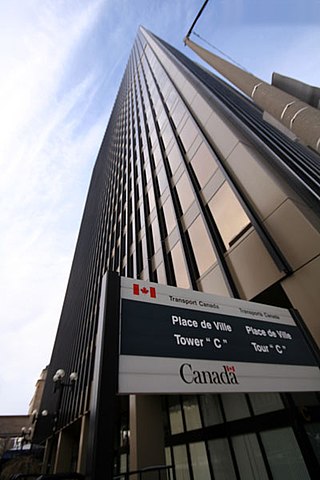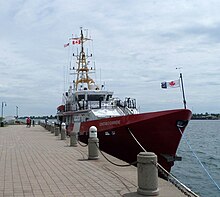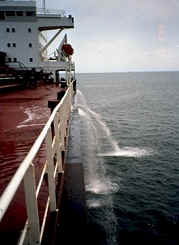Environment and Climate Change Canada is the department of the Government of Canada responsible for coordinating environmental policies and programs, as well as preserving and enhancing the natural environment and renewable resources. It is also colloquially known by its former name, Environment Canada.
Immigration, Refugees and Citizenship Canada is the department of the Government of Canada with responsibility for matters dealing with immigration to Canada, refugees, and Canadian citizenship. The department was established in 1994 following a reorganization.
Canadian securities regulation is managed through the laws and agencies established by Canada's 10 provincial and 3 territorial governments. Each province and territory has a securities commission or equivalent authority with its own provincial or territorial legislation.
Fisheries and Oceans Canada is a department of the Government of Canada that is responsible for developing and implementing policies and programs in support of Canada's economic, ecological and scientific interests in oceans and inland waters. Its mandate includes responsibility for the conservation and sustainable use of Canada's fisheries resources while continuing to provide safe, effective and environmentally sound marine services that are responsive to the needs of Canadians in a global economy.
Innovation, Science and Economic Development Canada is a department of the Government of Canada. ISED is responsible for a number of the federal government's functions in regulating industry and commerce, promoting science and innovation, and supporting economic development. The department was known as Industry Canada (IC) prior to 2015.

Transport Canada is the department within the Government of Canada responsible for developing regulations, policies and services of road, rail, marine and air transportation in Canada. It is part of the Transportation, Infrastructure and Communities (TIC) portfolio. The current Minister of Transport is Pablo Rodriguez. Transport Canada is headquartered in Ottawa, Ontario.

Australian Maritime Safety Authority (AMSA) is an Australian statutory authority responsible for the regulation and safety oversight of Australia's shipping fleet and management of Australia's international maritime obligations. The authority has jurisdiction over Australia's exclusive economic zone which covers an area of 11,000,000 square kilometres (4,200,000 sq mi). AMSA maintains Australia's shipping registries: the general and the international shipping registers.

Section 30 of the Canadian Charter of Rights and Freedoms is a section that, like other provisions within the section 25 to section 31 block, provides a guide as to how Charter rights should be interpreted and applied by Canadian courts. It addresses how the Charter applies in the territories of Canada. In 1982, when it became law, these were the Northwest Territories and the Yukon Territory. The Yukon Territory is now called Yukon, and Nunavut was created from the eastern Northwest Territories to become Canada's third territory in 1999.

Canadian immigration and refugee law concerns the area of law related to the admission of foreign nationals into Canada, their rights and responsibilities once admitted, and the conditions of their removal. The primary law on these matters is in the Immigration and Refugee Protection Act, whose goals include economic growth, family reunification, and compliance with humanitarian treaties.
Yukon Jack is a liqueur, made from Canadian whisky and honey. It is named after the pioneer Leroy Napoleon 'Jack' McQuesten. In Canada, it is 40% alcohol by volume, whereas in the United States, it is 50% ABV. The origin of the liqueur is unknown, but it was advertised in Maryland in the United States as early as 1946, later imported by Heublein Inc in the 1970s. It is now owned by the Sazerac Company. Yukon Jack was selected as the regimental liqueur used for special occasions and commemorations for the South Alberta Light Horse and the 19th Alberta Dragoons.
The flag state of a merchant vessel is the jurisdiction under whose laws the vessel is registered or licensed, and is deemed the nationality of the vessel. A merchant vessel must be registered and can only be registered in one jurisdiction, but may change the jurisdiction in which it is registered. The flag state has the authority and responsibility to enforce regulations over vessels registered under its flag, including those relating to inspection, certification, and issuance of safety and pollution prevention documents. As a ship operates under the laws of its flag state, these laws are applicable if the ship is involved in an admiralty case.

The Merchant Shipping Act 1995 is an act of Parliament passed in the United Kingdom in 1995. It consolidated much of the UK's maritime legislation, repealing several Acts in their entirety and provisions in many more, some dating back to the mid-nineteenth century. It appoints several officers of Admiralty Jurisdiction such as the Receiver of Wreck. The act of 1995 updates the prior Merchant Shipping Act 1894. The lead part on British ships was impacted by the outcome of the Factortame case, as the Merchant Shipping Act 1988 was impugned by the Common Fisheries Policy.

The Port of Vancouver is the largest port in Canada and the fourth largest in North America by tonnes of cargo, facilitating trade between Canada and more than 170 world economies. The port is managed by the Vancouver Fraser Port Authority, which was created in 2008 as an amalgamation of the former Port of Vancouver, the North Fraser Port Authority, and the Fraser River Port Authority. It is the principal authority for shipping and port-related land and sea use in the Metro Vancouver region.
Transport law is the area of law dealing with transport. The laws can apply very broadly at a transport system level or more narrowly to transport things or activities within that system such as vehicles, things and behaviours. Transport law is generally found in two main areas:

Canadian privacy law is derived from the common law, statutes of the Parliament of Canada and the various provincial legislatures, and the Canadian Charter of Rights and Freedoms. Perhaps ironically, Canada's legal conceptualization of privacy, along with most modern legal Western conceptions of privacy, can be traced back to Warren and Brandeis’s "The Right to Privacy" published in the Harvard Law Review in 1890, Holvast states "Almost all authors on privacy start the discussion with the famous article 'The Right to Privacy' of Samuel Warren and Louis Brandeis".
The Deep Geologic Repository Project (DGR) was a proposal by Ontario Power Generation (OPG) in 2002 for the site preparation, construction, operation, decommissioning and abandonment of a deep geological radioactive waste disposal facility for low and intermediate-level radioactive waste (L&ILW). In 2005, the municipality of Kincardine, Ontario volunteered to host the facility located on the Bruce nuclear generating station adjacent to OPG's Western Waste Management Facility (WWMF). The facility would have managed L&ILW produced from the continued operation of OPG-owned nuclear generating stations at the Bruce, Pickering Nuclear Generating Station and Darlington Nuclear Generating Station in Ontario. In May 2020, after 15 years of environmental assessment, OPG withdrew its application for a construction license on Saugeen Ojibway Nation Territory.
Rail regulations in Canada are set by Transport Canada and the Canadian Transportation Agency. The 2007 "Railway Safety Act Review" was commissioned by the Minister of Transport and its report provides much-needed background to this article, especially section 4.3. The governance of railways in Canada is complex and has many tiers: Acts of Parliament, Regulations, Rules, and Directives are only some of the instruments that impact this industry.

The Fisheries Act is legislation enacted by the Parliament of Canada, governing the powers of government to regulate fisheries and fishing vessels. The act has been undergoing major regulatory revisions in recent years, including those attached to treaty rights of Miꞌkmaq in Atlantic Canada. The Minister designated under the Act is the Ministers of Fisheries, Oceans and the Canadian Coast Guard.

The Oceans Act is a law enacted by the Parliament of Canada, and addresses Canada's self-definition of its territorial waters, exclusive economic zones, and other maritime boundaries. It additionally governs the creation of marine protected zones, the powers of the Canadian Minister of Fisheries and Oceans, and houses the legislative enactment the Canadian Coast Guard.

The Financial Administration Act is legislation enacted by the Parliament of Canada, governing financial administration of the government, public assets, the estimates process, the Department of Finance, the Treasury Board of Canada and Crown Corporations. The Government of Canada has described the act as the "cornerstone of the legal framework for general financial management and accountability of public service organizations and Crown corporations."










